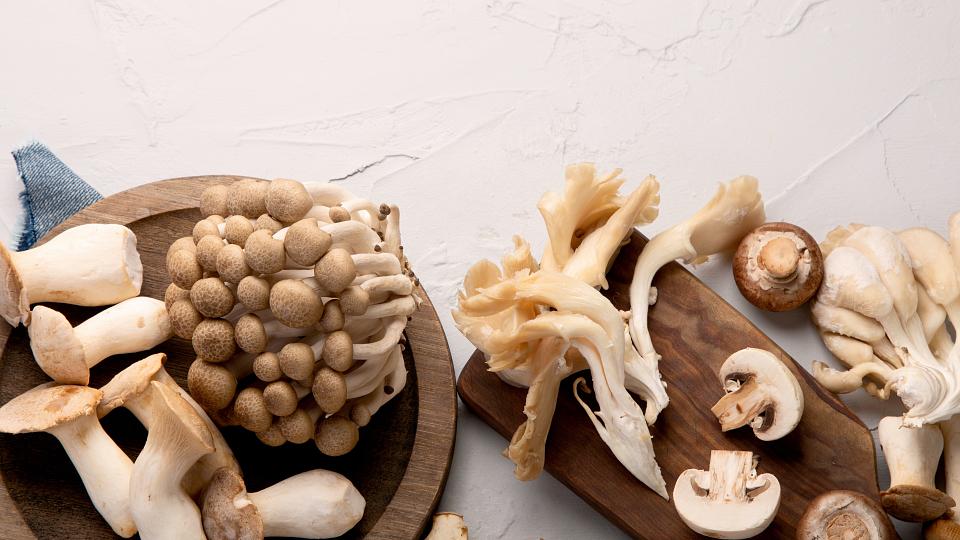
Functional Mushrooms: What’s Up with These Fun Guys?
If you've been to any health food store recently, you may have noticed mushroom supplements are all the rage. But what is all the hype about? Functional mushrooms like reishi, cordyceps, shitake, turkey tail, and lion’s mane have made an appearance in the wellness world, and health influencers claim they have immense health benefits.
Registered dietitians at University of Utah Health look into this new health craze.
What are functional mushrooms?
Functional mushrooms are fungi that, according to supplement companies and wellness influencers, provide health benefits beyond nutrition.
Many people think of functional mushrooms as part of traditional Chinese medicine, but they have been used by many indigenous cultures all over the world for more than 2,000 years. The use of mushrooms is intertwined with indigenous wisdom and traditions, medicine, and recreation.
Unverified health benefits
Some of the supposed health benefits of functional mushrooms include:
- Enhanced memory
- Better focus
- Better mood
- Longevity
Unfortunately, these claimed benefits don’t stack up to the research. While some of the claimed benefits of functional mushrooms have some research to support their use, most of the research supporting these claims is done in animal models, and more human research is needed. But consider the form in which you consume functional mushrooms—a whole food source vs. a supplement makes a difference!
Research-supported benefits of functional mushrooms
“The more established benefits surrounding mushrooms are due to their richness in prebiotic fibers,” says Sofia Whitefields, a registered dietitian at University of Utah Health’s OSHER Center for Integrative Health. Prebiotic fibers keep our microbiome healthy by giving our microbes the food they need to stay alive and healthy. “Eating the whole fungus is the only way to obtain these prebiotic fibers.” While there isn’t conclusive research to support the use of processed mushroom supplements, consuming any edible mushroom in whole food form has benefits for gut health and blood sugar control.
All types of edible mushrooms can help to support blood sugar control due to their high level of beta-glucans, a type of soluble fiber that’s also present in oats and barley. Soluble fiber like the kind found in mushrooms supports blood sugar control by slowing digestion and the release of sugar into the bloodstream. Additionally, fiber-rich whole mushrooms help support the growth of a diverse community of good gut microbes.
However, when functional mushrooms are broken down into pill form, these fibers are broken down. This is why eating the whole mushroom is likely to provide more benefits than a supplement.
Consuming functional mushrooms safely
Currently, you can buy functional mushrooms in a pill, powder, coffee alternative, or whole food form. Because the Food and Drug Administration (FDA) does not regulate supplements like it does with food, registered dietitians at University of Utah Health urge caution and judgment when purchasing supplements, as contamination and toxicity may be a concern.
If you are planning to purchase functional mushroom supplements, “Look for third-party tested supplements with the USP or NFS seal on it,” Whitefields says. “Supplements can also interact with foods and medication, so consider going to NatMed.com or talking to your pharmacist.”
Everyone's health journey is individual, so make sure to do what is best for you. Consult with your doctor or a registered dietitian to make informed decisions when adding supplements to your routine.
How to bring more mushrooms into your life
There are many ways to consume mushrooms. Cooking with mushrooms is a great way to get your fungus fix while also adding flavor and nutrition to your dish. Here are some quick and easy ideas.
- Sautéed: Mushrooms like shitake or lion’s mane taste delicious when cooked with olive oil and onions. Next time you are sautéing onions and garlic, consider adding some mushrooms to bump up the flavor.
- Meat alternative: Lion’s mane and other mushrooms make a great “meat” alternative. When broken up and marinated in soy sauce, spices, and herbs—or cooked up in butter or ghee—they provide an amazing umami flavor and make a great meat replacement. Try it in your next taco night!
- On a budget: If you are on a budget, your typical button and cremini mushrooms are also great for your health (and taste delicious).
Set a goal to get creative in the kitchen with mushrooms and other tasty vegetables.
How Mindfulness Can Ease Stress and Improve Your Physical Health
Mindfulness practices can help with stress, depression, and anxiety—but research has shown that they can also help with physical conditions.






